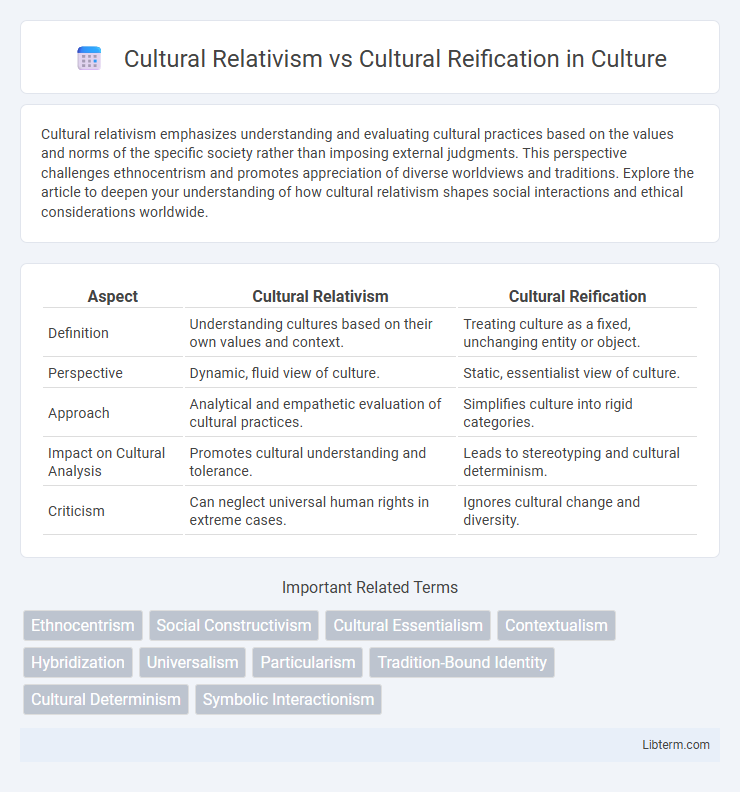Cultural relativism emphasizes understanding and evaluating cultural practices based on the values and norms of the specific society rather than imposing external judgments. This perspective challenges ethnocentrism and promotes appreciation of diverse worldviews and traditions. Explore the article to deepen your understanding of how cultural relativism shapes social interactions and ethical considerations worldwide.
Table of Comparison
| Aspect | Cultural Relativism | Cultural Reification |
|---|---|---|
| Definition | Understanding cultures based on their own values and context. | Treating culture as a fixed, unchanging entity or object. |
| Perspective | Dynamic, fluid view of culture. | Static, essentialist view of culture. |
| Approach | Analytical and empathetic evaluation of cultural practices. | Simplifies culture into rigid categories. |
| Impact on Cultural Analysis | Promotes cultural understanding and tolerance. | Leads to stereotyping and cultural determinism. |
| Criticism | Can neglect universal human rights in extreme cases. | Ignores cultural change and diversity. |
Introduction to Cultural Relativism and Cultural Reification
Cultural relativism promotes understanding and evaluating cultural practices within their own societal context, emphasizing respect for diversity and avoiding ethnocentric judgments. Cultural reification, conversely, treats cultural traits as fixed and unchanging entities, ignoring the dynamic and fluid nature of cultural expressions. This distinction highlights the importance of analyzing cultures as evolving constructs rather than static objects.
Defining Cultural Relativism
Cultural relativism is the anthropological principle that views cultural practices and beliefs within their own social contexts, avoiding ethnocentric judgments. It promotes understanding different cultures by recognizing their unique values and norms as equally valid and meaningful. This approach contrasts sharply with cultural reification, which treats cultural traits as fixed, unchanging entities rather than dynamic and interpretive social constructs.
Understanding Cultural Reification
Cultural reification involves treating culture as a fixed, unchanging entity rather than a dynamic, evolving process shaped by human actions and social interactions. This perspective can lead to stereotyping and oversimplification, obscuring the complexities and variations within cultural practices. Understanding cultural reification is crucial for recognizing how power dynamics and social structures influence the construction and interpretation of cultural identities.
Origins and Historical Context
Cultural relativism emerged in the early 20th century, rooted in anthropological studies by scholars like Franz Boas who challenged ethnocentric views by emphasizing the understanding of cultures on their own terms. Cultural reification developed as a critique, highlighting how culture can be mistakenly treated as a fixed, static entity rather than dynamic and evolving, often linked to Marxist theory and critical sociology. The historical context of both concepts reflects evolving debates about objectivity, power, and representation in the study of societies and cultural phenomena.
Key Philosophical Differences
Cultural relativism emphasizes understanding cultural practices and beliefs within their own context, rejecting universal moral standards to appreciate diversity without judgment. Cultural reification treats cultural traits as fixed, unchangeable entities, often leading to stereotypes and essentialism that ignore historical and social dynamics. The key philosophical difference lies in relativism's dynamic, context-sensitive approach versus reification's static, rigid categorization of cultures.
Examples from Anthropology and Sociology
Cultural relativism in anthropology emphasizes understanding cultural practices within their own contexts, such as studying Nacirema rituals without ethnocentric bias, while cultural reification in sociology critiques how abstract ideas about culture can become treated as fixed entities, like stereotyping immigrant communities based on generalized traits. Anthropologists analyze the diversity of kinship systems among the Yanomami to highlight cultural relativism, whereas sociologists examine how media portrayals reify cultural identities, leading to social stratification and prejudice. These contrasting approaches reveal how cultural relativism fosters empathy and context-specific interpretation, whereas cultural reification risks oversimplification and essentialism.
Positive Impacts of Cultural Relativism
Cultural relativism fosters empathy and deeper understanding by encouraging individuals to view beliefs and practices within their cultural contexts, reducing ethnocentric judgments. It promotes social cohesion and respect for diversity, facilitating cross-cultural dialogue and collaboration. By challenging stereotypes and fixed cultural assumptions, cultural relativism supports more inclusive and adaptive social policies.
Criticisms of Cultural Reification
Cultural reification faces criticism for its tendency to fix cultures as static, essentialized entities, which overlooks internal diversity and social change within cultural groups. This approach risks reinforcing stereotypes and justifying unequal power dynamics by treating culture as an unchanging, monolithic force rather than a dynamic process shaped by individuals. Critics argue that cultural reification undermines critical analysis by ignoring historical context and the fluidity of cultural identities.
Practical Implications in Modern Societies
Cultural relativism promotes understanding and tolerance by evaluating beliefs and practices within their cultural context, which helps reduce ethnocentrism and fosters social cohesion in diverse societies. Cultural reification, however, risks solidifying stereotypes and inhibiting social change by treating culture as a fixed, unchanging entity rather than a dynamic process. In practice, balancing these concepts is crucial for policymakers and social leaders to navigate multicultural environments effectively, ensuring respect for diversity while encouraging cultural evolution.
Moving Toward a Balanced Cultural Perspective
Cultural relativism emphasizes understanding cultural practices within their own contexts, avoiding ethnocentric judgments, while cultural reification risks freezing cultures into static, unchanging entities. Moving toward a balanced cultural perspective requires recognizing both the dynamic, evolving nature of cultures and respecting internal meanings. This approach promotes intercultural dialogue that values diversity without essentializing cultural identities.
Cultural Relativism Infographic

 libterm.com
libterm.com